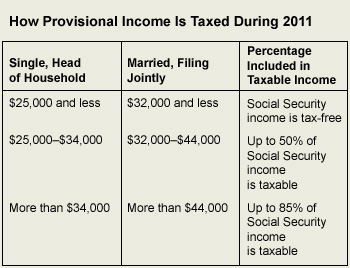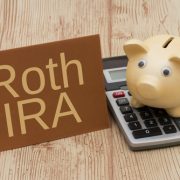Taxes and Your Social Security
Your benefits may be taxed. But a little up-front planning today can minimize the hit tomorrow.
After years of planning for that perfect retirement — diligently investing your money, drawing up detailed budgets and investing assets wisely — many investors continue to miss one important detail. As much as 85% of your Social Security income could be subject to federal (and possibly state) income taxes. That can be a real shock when you collect your first check.
How much of your Social Security income is subject to tax depends on a variety of factors, including your marital status and any additional income you earn. But with a little up-front planning, which can include everything from rebalancing your portfolio to structuring certain transactions (like the sale of a home or a business), you don’t have to let taxes derail your plans.
How Taxes Are Calculated
Social Security benefit taxes are based on what is commonly referred to as your “provisional income.” That includes half your Social Security income for the year, plus your modified adjusted gross income, which includes (among other items) any tax-exempt income. (Tax-exempt income includes interest from municipal bonds — often a core component of retirement portfolios.) After you cross these income thresholds, a portion of your Social Security benefits will be considered taxable income. (See the chart below for specifics.) For example, married couples who file their tax returns jointly and have provisional income of at least $44,000 could see up to 85% of their benefits get a haircut from the tax man.

A Longer-Term Strategy
Because of these income thresholds, tax planning experts often advise looking for ways to lower your provisional income. “When you plan for retirement,” says Vinay Navani, a shareholder with Wilkin & Guttenplan, an accounting and consulting firm in East Brunswick, New Jersey, “you need to think in terms of multiyear projections.” For example, if you anticipate a big one-time event such as the sale of a business, you may be better off structuring the sale as an installment sale to be paid off over several years instead of an all-cash transaction This can help lower your overall income and possibly keep you in a lower tax bracket, which would help minimize that tax hit on your SSI benefits.
You may also want to consider a longer-term strategy for drawing out of your qualified retirement accounts. That’s because all withdrawals from a traditional IRA typically will be included in your provisional income calculations. Income drawn out of a Roth IRA, however, is not. So you may want to consider withdrawing from the Roth first.
On the other hand, if you’re earning income in retirement, you can still contribute to an IRA, and contributions into a traditional IRA may be tax tax-deductible, lowering your provisional income. A word of caution, though, if you are considering converting a traditional IRA to a Roth: Any amount you move will also be counted as income. That may be worth it, though, because of the Roth’s other tax advantages.
Another option is to convert an investment that earns taxable income, such as a taxable bond portfolio, into a tax-deferred account, such as a deferred annuity. You could structure the annuity to begin paying income in a few years, when you expect your provisional income, as well as your overall tax rate, to decline.
Know the Penalties
Those hoping to work in retirement need to be especially careful if they’re planning to claim Social Security benefits early. According to a 2010 study by the Families and Work Institute and the Sloan Center on Aging & Work at Boston College, three-quarters of workers age 50 and older say they expect to hold some kind of income-generating job after retiring. It’s important to consider how that income will affect your benefits.
The Social Security Administration caps how much you are allowed to earn if you start taking your benefits before “full retirement age,” which the SSA considers 66 for most baby boomers. In 2011, the annual earned income cap is $14,160, and for every $2 you earn over that limit, the SSA trims $1 off the top of your benefits. So if you earn $20,000 this year, and you haven’t yet reached full retirement age, your benefits will be reduced by $2,920 — on top of any income taxes you may have to pay on the remaining benefits.
There is some good news, however: Because the penalty is determined by your individual earned income, if you retire early and your spouse doesn’t, and if you file separately, your spouse’s earned income will not be factored into any benefit cuts that could apply. However, if you file jointly, your spouse’s earnings will be included when calculating your provisional income. Additionally, when you reach your full retirement age, the earned income penalty disappears.
Forewarned Is Forearmed
Lastly, do a bit of homework. Worksheets in IRS Publication 915, Social Security and Equivalent Railroad Retirement Benefits, available at www.irs.gov, can help you compute your tax liability. Then check with your state to see whether it taxes benefits. You might not be able to avoid taxes, but at least you’ll know what to expect and will be able to plan accordingly. As always, your Financial Advisor can work with your tax professional to find the best solutions.
Source: Forbes




